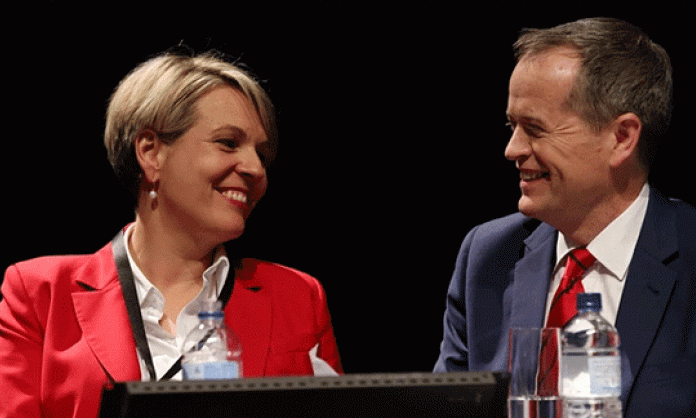The argument for the existence of the ALP's left faction has long been that progressive people should join the ALP, work to increase their influence, eventually win control of the party, and introduce more progressive social policies.
The recent ALP national conference represents another nail in the coffin for this argument.
For the first time in decades, the right lost control of the numbers on the conference floor. As Age journalist Nicholas Reece wrote prior to the meeting, “neither the left nor the right will control the numbers on the floor of the ALP conference. Of the 397 delegate votes, the left commands 196, the Right 197 and four are unaligned.”
Even without an outright majority, the left had an historic opportunity to assert itself.
Not only could it have galvanised opposition to Shorten’s vicious boat turn back policy, it could have made some real headway undoing the party’s existing racist refugee policy, which includes support for offshore processing and the hell-hole concentration camps on Manus Island and Nauru.
It could have pushed for an immediate binding vote on marriage equality. And it could have struck a blow against any one of the policy areas in which neoliberalism has become entrenched in the ALP’s programs, from cuts to public spending and privatisation, to anti-union laws.
And yet not a single piece of progressive policy was adopted at the conference, nor existing reactionary policy scrapped. Refugees will be subject to as savage barbarity under a future ALP government as they have under Abbott. LGBTI people will have to wait until 2019 before the ALP will get serious about equal rights.
ALP members are now no longer required to be members of a trade union, further distancing the party from the workers’ movement. And the “socialisation objective”, one remaining throwback to a time when the party at least had pretensions to standing for reform, looks set to be reviewed. Leading the charge for the objective to be dropped is the left’s Luke Foley, leader of the opposition in NSW.
The fact that racist atrocities and attacks on workers’ rights will be carried out by an equal number of women as men by 2025 does nothing to change this appalling state of affairs.
The electoral viability of the party and its leader proved more important than the human rights of refugees, workers or the poor. The lives of some of the most vulnerable people on the planet were duly sacrificed on the altar of party unity and electoralism.
This is how crimes against humanity are committed in the modern age: through the gradual accretion of pragmatic decisions rationalised by appeals to electoral necessity or other self-serving goals, more often than not on the part of those whose stated intention is to ameliorate these atrocities.
The purpose of the left
The 2015 conference has graphically illustrated that the role of the Labor left is in fact not to win the party to a more left wing agenda. Instead, it is to create the illusion that the ALP can potentially be a vehicle for social reform and a home for progressive or left wing people.
For outsiders to the conference, there is a great deal of confusion about how the votes on the floor actually went. This is indicative of the left’s failure. The faction refused even to discipline its own ranks. How incredibly convenient – the left gets to say that there were robust discussions and disagreements; that there were impassioned speeches in opposition. But the opposition could only have been calculated to fail.
The left’s role is to create window dressing for the party. When the chance comes to flex its muscles, as was the case on the weekend, it shies away from the task and instead facilitates a victory – both in policy and in public relations – for the leader. In this way the energy of those who might otherwise be fighting the ALP’s reactionary policies is harnessed to apologise for them, and worse, to campaign for their realisation.
This has a double benefit for the ALP leadership: to capture the loyalty of those seeking reform and in so doing expand the party’s electoral appeal, and to weaken the independent left. It is a dead end for anyone interested in social justice.
But the problem is not just the failure of the left to follow through with its purported purpose. It is also that it is politically bankrupt and largely without credible claim to even being left wing. It is damning that even before Shorten announced boat turn backs as policy, many on the left were already in favour of it.
One of these was high profile refugee advocate and member of the Labor left Brad Chilcott, who wrote an article supporting turn backs well before Shorten’s announcement. Chilcott’s statement elicited no condemnation from the left.
Likewise, darling of the left Tanya Plibersek described the ALP refugee policy as “terrific”, telling journalists on Sunday that she “could not be prouder”. Institutionalised torture. Denial of basic human rights. Rampant abuse. Sexual assaults. Psychological trauma. Attempted suicides. “Could not be prouder”.
According to Senator Kim Carr, also from the left faction, Plibersek argued hard for the turn back policy in the left caucus. She “spoke very strongly in support of the shadow cabinet’s position at the various meetings I attended”, Carr told Sky News.
She then slinked pathetically away when the vote was taken, attempting to preserve her public left veneer while not publicly opposing the right or embarrassing her leader.
The left fell in behind Shorten not only for the sake of his leadership, but also because many of them simply supported his agenda.
More than ever today, the ALP left is without anything resembling principle and increasingly is little more than an electoral appendage to the party machine. It has well and truly embraced neoliberalism, and does nothing to build a genuine alternative to the right wing drift of the party.
Such an alternative would take as its starting point standing up for workers and the oppressed, not seeking power in parliament as an end in itself.









